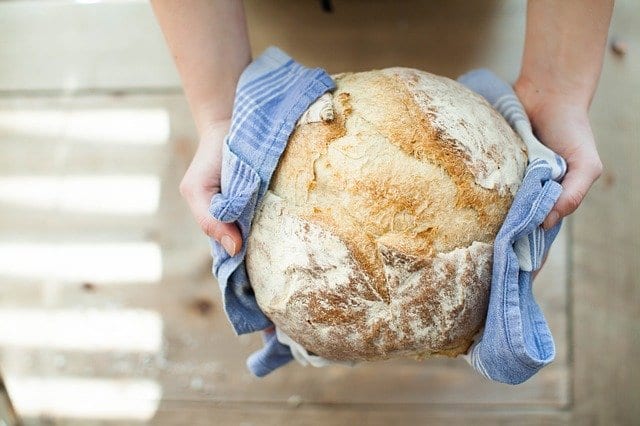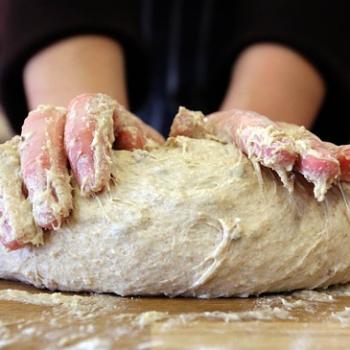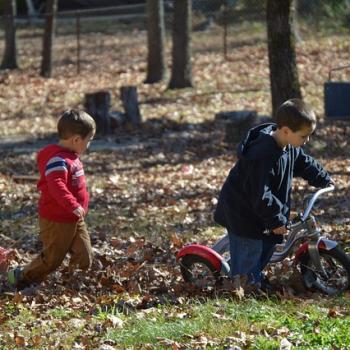
This weekend, we all got mad at somebody called Caren White, who wrote an article for Medium demanding that everybody stop baking homemade bread during the pandemic.
In case you missed it, Caren’s hissy fit of an article was all about how she couldn’t find the organic flour she preferred, because it was sold out, because so many people are baking their own bread for the first time. She chided the amateur bakers and called them “dilettantes,” accusing them of just wanting to bake bread to show it off. She seemed to think that everyone who has recently taken up baking is baking the bread just to show it off and then throw it away. She didn’t seem to realize that they’re baking because there are shortages of all kinds of food at the stores these days, and they need bread to eat just as she needs bread to eat. They’re not getting bread for their sandwiches from their work or school cafeterias or from the takeout restaurant on the way home from work, and they might not be able to get bread from the bread section of the grocery store either. They’re practicing social distancing and leaving the house only when absolutely necessary, which means they don’t go out for fresh bread that stales quickly as often as they used to, which means they might buy flour instead and try to bake it themselves. And, yes, I suppose a few people might be trying their hand at baking for a hobby while they’re trapped at home lonely and traumatized, but they’re still eating it. And so we have a temporary shortage of flour and yeast at many grocery stores.
Caren claimed that people were “creating food insecurity” by baking bread– rather than baking bread being one of the results of food insecurity. All she could think about was the fact that she, personally, was inconvenienced. And she wanted other people to be inconvenienced MORE so that she could live exactly as she wished.
I’m showing you a link to another lampooning of that article, rather than the article itself, because Caren took her article down and deleted her whole Medium account after a tremendous backlash. If she hadn’t done that, you might have been able to see that most of her previous articles were about organic eco gardening and the one before Breadgate was about how she became a hoarder of toilet paper and meat when COVID started. She doesn’t sound like a nice lady.
I was mortified just reading this article– not least because I, myself, am also a fussy eater and an organic eco gardener. I’m not a “master gardener” like Caren, I’m just somebody who loves to grow heirloom vegetables. I do it in my backyard. Sometimes I only have the strength to sow a few pea plants, but most years I try to do much more. I have grown organic popcorn, which Caren boasted about. It’s fun. I am always experimenting with how to get the best food for the cheapest, because I don’t have much money.
And as a snobby person who grows organic vegetables in her backyard and has for years, I would like to tell all you dilettantes trying it for the first time and photographing it online to show off to your friends to ease your pain and sense of isolation during a pandemic: Keep it up! You’re awesome. Gardening is a great hobby that’s good for mental health and the environment.
The first thing you need to know is that you should be stirring some chicken or cow poo into your compost heap, which makes it break down faster and just helps the quality. Don’t neglect composting just because you’re afraid it will be gross; it’s actually more fun even than gardening. It’s so satisfying to turn garbage into rich black loam that looks like brownies. Put all your fruit and vegetable waste, your grass clippings and your eggshells in the compost. Turn the heap over once in awhile. It’s delightful. Just think of all the carbon you’re returning to the earth where it belongs.
The next thing to know is that weeds are not the enemy– they’re just annoying, that’s all. You can actually harvest the dandelions, pigweed and violets taking over your garden bed right now and make them into a salad while you wait for your other vegetables, if you’re sure they haven’t been sprayed. Don’t eat the rhisomes, the runners that go under the ground, on violet plants; those are toxic but the part above the ground isn’t. And for dandelions, you can eat the whole thing. They’re extremely bitter if they’re mature, but tiny dandelions are milder. And the best way I’ve seen to keep the weeds out of your garden in the first place is to grow the plants a little closer together than you think you’re supposed to, so they shade the ground and keep weeds from growing; also, mulch. You can buy mulch, but you can also make it out of straw or shredded cardboard. I’m going to try the cardboard mulch technique this year for the first time, so I’ll let you know in the fall how well it worked. Some people think that since cardboard is man-made it’s not really suitable for organic gardening, but my opinion is that the perfect is the enemy of the good and we should all be doing the best we can in these trying times. Cardboard will break down like compost eventually.
The next thing you need to know, is that if your young summer squash have started getting brown and yucky after a heavy rain, all is not lost. That’s a sign of a calcium deficiency. Water the plants with milk a few times and it will go away– or, you can dust powdered milk around the roots before rain. I’ve even used a bottle of calcium supplements crushed and scattered on the soil.
And now I’ve got a message for all of you silly noobs, not just the amateur gardeners but those staying home from work and baking your own bread, sewing your own linens, knitting and crocheting for the first time, going back to the painting hobby you had in high school: you are valid, your suffering is understandable, and your trying to stay afloat any way you can in these trying times is really a sign of your courage. It always takes courage to try something new. And here you are trying something new to make one tiny corner of our tormented earth a little more beautiful and healthy, during a global nightmare that has traumatized the world. That’s monumental courage.
Maybe you didn’t think of it that way when you got started. Maybe you’re just thinking of yourself as bored out of your mind and looking for a hobby that gets your hands dirty so you won’t read the news on your phone again. But you really are courageous.
Everyone who’s reading this is going through a tremendous strain. I think it’s wonderful that so many people are coping with the strain by making things. We’re making art, we’re learning to sew, we’re learning to cook and bake, we’re gardening. Those are wonderful, valuable things you should be proud of, skills you can take with you into whatever life throws at you next. Our messed up society will try to shame us for not being good at it the very first time, for not finding ways to make it into a marketable skill. But I’m here to tell you right now that it’s enough just to try your best.
I’m proud of you.
If you accidentally hoarded up more supplies for the thing you’re making than you need right now, be sure to share it with somebody else. Maybe swap some of your flour for yeast with a neighbor, or set up a seed exchange for local gardens. But I’m really glad you’re doing such good things to keep busy.
Maybe we can all think of ways to share the things we produce with our neighbors as well, to share the joy of what we’ve made and to help one another. My friend who learned to sew is sewing cloth masks and distributing them to anyone who asks for one. I baked some homemade banana bread for the homeless at The Friendship Room the other day, and I’m going to give them a share of my vegetables as well. One of us should check on Caren and bring her a baguette. She seems to need it.
Be nice to each other.
Image via Pixabay
Mary Pezzulo is the author of Meditations on the Way of the Cross.
Steel Magnificat operates almost entirely on tips. To tip the author, visit our donate page.

















